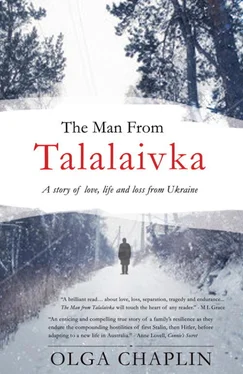Peter’s heart felt too heavy; he could not speak. His eyes welled in the protective dark. His stomach tightened painfully at his inability to help Viktor, their days of innocent belief in Lenin’s opening egalitarianism now a lost dream, like the pile of dust scattered at their feet. Nothing, it seemed, could stop the tyrant Stalin from eliminating—‘liquidating’—whichever person, whatever layer of his newly-devised regime, that his monstrous mind constantly created as potential rivals.
They stood and hugged as brothers in the damp dark. Each knew they would not meet again. Viktor’s sentence, his certain death from one of Stalin’s bullets, or wasted moments in the gulag would, like millions of other unnecessary deaths, go unrecorded. Peter felt torn: he grasped Viktor’s shoulders one last time, tears of sadness, regret, hopelessness, escaping him, as he finally closed shut the huge unwieldy door. His friend disappeared into the night, to await a new day of service to his country and the regime, before the ‘guillotine’ came down on him, as on so many innocent others. He hoped Viktor’s suffering would be short: prayed this, to his Maker, into the blackened night, to ease the pain he felt for yet another luckless victim of the Terror.
* * *
Peter waited a little longer as Evdokia said her farewell to her elders. His heart reached out to Klavdina as she clung to her daughter, unable to let her go, her diminutive frame more fragile as her shoulders heaved with emotion. At last, as he helped Evdokia into the buggy, he noted her pallor. The heavy man’s harvesting work enforced on her this past week by a new supervisor at her parents’ kolkhoz, who had disregarded her leave conditions and her present delicate disposition, had exhausted her and had placed her health at risk. He silently prayed for her wellbeing: a full day’s journey on these unstable country roads in the heat of summer could worsen her condition. He had a deadline to meet, their travel documents specifying their date of return. He had memorised the date: ‘12th June, 1937’, should unscrupulous officials in this kolkhoz confiscate the documents. But his wife’s condition could not be further endangered. If need be, he would risk reprisal from his own kolkhoz officials to ensure Evdokia’s safety. Their own soviet bureaucrats had somehow, inexplicably, not been tarnished with cruelty of late, as some of these others. He would appeal to them, if necessary.
The last moments of Klavdina’s waving scarf, as she farewelled them from the farmhouse, were heart-wrenching for him, and for Evdokia. In her emotional state only the rough country lane distracted her, forcing her to protect herself and to settle Manya and Mykola. A cooling breeze temporarily comforted them, enabling him to make reasonable progress as he steered his muscled horse to their Popivshchena kolkhoz. Yet the sense of foreboding remained. For good reason. Too much had happened in recent weeks to suppose Stalin’s torment of the masses would remain subdued.
Even as Peter reined his horse onto the familiar road in sight of Popivshchena, Marshal Tukhachevsky’s execution was announced. Vasily had lost his Viktor to the insatiable Stalinist Terror scourge; Evdokia had lost her hoped-for child, the price for such harsh work at the behest of cruel kolkhoz officials. The Ukraine, and Russia, had lost the young charismatic Marshal Tukhachevsky, the last visionary leader still imbued with Lenin’s ideals and a sense of right and honour, and who also could have protected them from a future military catastrophe that was to befall them. The price paid was personal, and national. Too many unclaimed souls could testify to that.

Chapter 17
June 1941
Munificent morning sunlight, in the swansong of unfettered collectivisation, bathed and blessed the fields of wheat and the kolkhoz workers who had back-breakingly sown them. Evdokia picked her way carefully along the well-worn path as it wended its way towards the hallowed cemetery grounds, lifting her precious embroidered petticoat so tenderly sewn all those many summers ago in the comfort and security of her parents’ home in Yakemovich. She paused momentarily, catching her breath. She could still hear the voices of her little family ahead of her: Peter in animated conversation with a fellow kolkhoz neighbour, Manya and Mykola laughing and teasing each other as they ran towards the familiar meeting place.
“Catch me, Kola, if you can!” Manya called out gleefully as she darted back and forth from the pathway, tickling her younger brother and disappearing through the tall grasses again. Evdokia smiled as she adjusted her headscarf, and silently gave thanks for her healthy family. She cherished the Sunday pilgrimage in their controlled lives on the Popivshchena kolkhoz, which had become their home, their way of life, this past decade.
As she drew closer to the ancient cemetery grounds, golden heads of sunflowers bowed their approval at her as they swayed gently in summer’s breeze. She always experienced an inexplicable sense of spiritual transformation as she negotiated this familiar path. With her back to the old dark kolkhoz farmhouse, she could temporarily shut out the discomforts of their kolkhoz life, the cramped living conditions that until recently four families had endured. Vanya, Peter’s firstborn, was now a man of fourteen. She smiled, remembering the day Peter victoriously negotiated a separate bed for them, their first symbolic act of privacy, upon the death of the elder of the farmhouse.
Those same local soviet officials, who now allowed three remaining families to occupy the kolkhoz farmhouse, had also grudgingly approved the Sunday cemetery gatherings. They need not have worried. The local priest, a survivor of the purges and more flexible than his peers, had pragmatically become a soviet official, blessing his flock whilst cautioning them to remain faithful to the ideals of the Bolshevik revolution. The Ukrainian population had long been subdued, the continuous Five Year Plans were now entrenched as a way of life and Stalin’s purges of every strata of society, in the name of dogma and revolution, were now complete. All that lay before them was the predictability of the kolkhoz life, unattainable workers’ quotas for grain and food from the regime’s breadbasket of the Ukraine, and the certainty that dissent or personal misfortune inevitably led to imprisonment and execution. Six million Ukrainian souls had learnt this tragic lesson.
The priest had already begun his familiar liturgical prayers. Peter moved towards Evdokia as she stepped around overgrown mounds of graves, crosses missing, towards the fresh burial plots. “So there you are,” he murmured, eyes teasing, his confident smile disarming her, as it always did. She beckoned to Manya and little Mykola, held their hands in solemn acknowledgement of the official prayers, then nodded to them as they hurried off to join their friends, at play in the ruins of the church, destroyed in the fervour of Stalin’s collectivisation.
An invisible hand of blessing passed over her as the priest sang the ritual final prayer. It was this ritual, this pilgrimage to the ancient grounds, which gave her sustenance to face each coming week: ahead were six days of back-breaking work on the kolkhoz farm, lack of comforts, perpetual bickering among the kolkhoz farmhouse families. The slender shape of an elderly woman, scarf hiding her face, reminded Evdokia of her dear, gentle mother. Her eyes pricked with tears. Several years had passed since her last permit to visit her parents in their kolkhoz on the farther reaches of Talalaivka. Such a short distance for Stalin and Khrushchev’s soviet officials, wanting for nothing, travelling freely for their comforts, yet such an impenetrable distance for her. Peter, though valued in his capacity as veterinary practitioner for their kolkhoz area, could not plead Evdokia’s case and he knew certain risks were not worth taking now. Stalin’s purges had conveniently ended with the outbreak of war in western Europe, but the NKVD maintained a ruthless vigilance.
Читать дальше













